Powerful Women on the Inside
Power Women: Laurie Hollman On How To Successfully Navigate Work, Love and Life As A Powerful Woman
An Interview With Ming Zhao
![]()

Please remember I am talking today about strong women on the inside, not those who must become public figures or actual warriors. These are women who are experienced by others as being confident in their beliefs while open to changing those beliefs, holding firmly to their values yet re-evaluating them as life proceeds, and having an inner voice they trust.
How does a successful, strong, and powerful woman navigate work, employee relationships, love, and life in a world that still feels uncomfortable with strong women? In this interview series, called “Power Women” we are talking to accomplished women leaders who share their stories and experiences navigating work, love and life as a powerful woman.
As a part of this series I had the distinct pleasure of interviewing Laurie Hollman.
Thank you so much for doing this with us! Before we dig in, our readers would like to get to know you a bit more. Can you tell us a bit about your “backstory”?
As a writer I started searching for powerful women in literature. They didn’t show up easily past or present. It was because I wasn’t looking for a powerful public woman in finance (Julie Monaco, Ida Liu) or in politics (Gloria Steinem, Michelle Obama) or in cinema (Jodie Foster, Helen Miren, Meyrl Streep) or in the arts (Emily Dickenson, Lee Krasner) nevertheless an anchor on CNN or MSNBC (Judy Woodruff, Rachel Maddow).
I knew I was looking for someone who was unknown actually, but — and this is a big but — she felt powerful on the inside. That was key.
If I couldn’t readily find her in books already written (fiction or non-fiction) and wasn’t looking further in history books or listening to contemporary news outlets, there was only one solution. I would write about her myself.
Then if I could feel powerful enough to believe in my female protagonist — a character overcoming an underestimated sense of self — then I could tell you about the powerful woman I have in mind.
Perhaps this women would be brave, perhaps brilliant, perhaps she would overcome major conflicts, obstacles, and challenges, well then in literature like in life I could tell you about a powerful woman — from the inside.
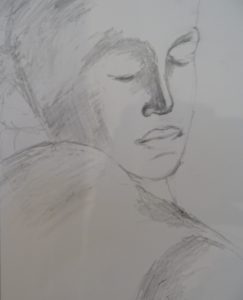
So, this is not a “back” story per se as you’ve asked for yet perhaps you’ll catch on to what’s inside of me as I proceed in this interview and tell you about my “future” story — writing about women who become able to feel powerful on the inside.
If you read about how they accomplish this then you can, too. And by the way, they will only have first names because the last names of women are always the names of men. It surprises me that more hasn’t been written about that peculiar fact.
I will add that I’m inspired by women who have immigrated to the United States fleeing persecution as teenagers and young adults. They often traveled on their own after harrowing experiences. How remarkable that courage is aligned with desperation — a blend of determination and resignation. I only hope that these valiant young women were able to feel a large measure of internal power and maybe even victorious moments.
Can you tell us the story about what led you to this particular career path?
My long career path has been as a psychoanalyst and psychoanalytic psychotherapist of infant-mother pairs, children, adolescents, and adults. An offshoot of my clinical work has been writing based on a desire to share clinical experiences and research. I began with scholarly articles juried internationally. But new to me in the past seven years has been publishing popular nonfiction hoping to make psychoanalytic concepts accessible to all readers. Most recently has been my leap into fiction. I have written two psychological novels where readers can hopefully experience the evolution of two very different and unusual female characters as they are transformed into women who feel powerful internally.
Can you share the most interesting story that happened to you since you began your career?
I hope the most interesting story is yet to come. That is, I strongly believe life holds continual learning opportunities. An interesting recent experience has been working with professional editors who have guided me into transforming my writing from clinical explorations of the transformations of personalities into believable female protagonists who show how their sense of self evolves in their interactions with other dynamic characters. It’s been enlightening to discover how characters I create live in my mind becoming as real to me as those in everyday life.
You are a successful business leader. Which three character traits do you think were most instrumental to your success? Can you please share a story or example for each?
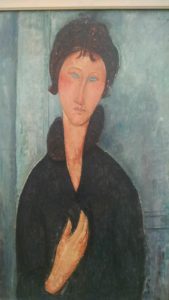
Take time to prioritize what is most important.
I have been a ‘business’ leader in that I effectively sustained a successful clinical solo practice for decades. Instrumental was my deep belief in the wisdom of promoting introspection during psychotherapy, my nonjudgmental stance with diverse individuals, and the perseverance and organizational skills imperative for sustaining a successful practice over a long period of time.
I had fascinating experiences working with highly successful narcissists who exploited others to sustain their defensive grandiosity. This required of me empathy for the emptiness they felt internally that was masked by their needed sources of continuous admiration. Detailed stories can be read in “Are You Living with a Narcissist” where I disguise those treated sometimes by creating composites of people I’ve worked with in order to help both professionals and lay readers learn how to relate to and feel compassion for the long-time suffering of those with narcissistic personalities.
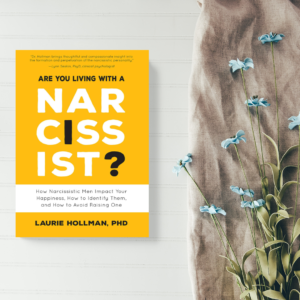
Ok, thank you for that. Let’s now jump to the primary focus of our interview. The premise of this series assumes that our society still feels uncomfortable with strong women. Why do you think this is so?
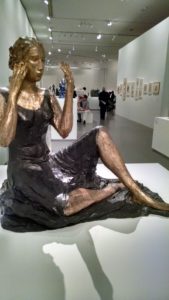
Take time for yourself
Please remember I am talking today about strong women on the inside, not those who must become public figures or actual warriors. These are women who are experienced by others as being confident in their beliefs while open to changing those beliefs, holding firmly to their values yet re-evaluating them as life proceeds, and having an inner voice they trust.
We often cite men who downplay these women because they feel threatened. The women are often underpaid, underpromoted, underrecognized, and faced with misogyny. However, in my personal experience a decidedly more complex discomfort I’ve found has been with other women struggling to feel secure in different stages of life.
Without saying any names, can you share a story from your own experience that illustrates this idea?
Contrary to today’s societal expectations that senior male colleagues may resent a rising young woman, I experienced older female colleagues who at first viewed me in their words “as a promising psychoanalyst” shift when I became successful in their eyes.
For example, one woman I admired gave me a party when I published my first scholarly article for an international journal. However later as my practice and writing continued on a positive course she became cold and critical on trivial matters. I can’t say why she took me on as her protégé and later surprised me with her cross attitude. Perhaps she was responding in some way to a youthful woman she perceived to be surpassing her expectations of herself over time. Or maybe she struggled with aging not realizing that one’s youth is incorporated in one’s aging.
What should a powerful woman do in a context where she feels that people are uneasy around her?
Experiences mentioned were unfortunate and curious attitudes to learn from. My way was to understate accomplishments in social settings when asked questions about my work by envious professionals and find actual friends to share my life with.
This self-protective style may alleviate some discomfort in others but not deter a woman from moving forward. The problem for others with similar experiences is when personal hurt prevents them from enjoying work challenges and results in a fear of accepting new opportunities that may alert competitors to untoward reactions.
What do we need to do as a society to change the unease around powerful women?
Although this is surely a societal problem there’s no reality that distinguishes it from a personal one when it happens to you. Societal attitudes are actually a myriad of a range of attitudes that appear to have coalesced when they have not. If the desire to belong to a group overrides an individual voice, it comes from a numbness to oneself built on fears of reprisal or fears of being alone.

Unease is personal and individual, unique to each. We can’t get around that and we can’t erase it in a group, only grow numb to it. Yet at the same time, discussions like this interview invite support for the alternative voice that remains hidden inside when pressured by a group. Each individual internal voice can change society when it listens to itself first. That’s why it’s so slow and prone to reversal again and again. We can’t ever absolutely change attitudes that are so complex and deep, we can only become more introspective one on one, until we see a window outside ourselves that offers the prospect of new perspectives.
In my own experience, I have observed that often women have to endure ridiculous or uncomfortable situations to achieve success that men don’t have to endure. Do you have a story like this from your own experience? Can you share it with us?
When a senior analyst asked me to become president of the analytic institute where I trained, both some older and younger women seemed to feel some resentment or unease when I was in that role. It wasn’t a role I sought out preferring clinical work to administration, but I felt I should be giving back to those who had taught me.
While in this role a female peer analyst’s voice scalded me when she returned from a vacation. She’s missed her deadline on an Institute article that in her absence I was asked to write as president. This was essentially an insignificant chore for me to take on not wanting to question her for not completing her work before her vacation (my sense that she was uneasy with my role led to my consequent reluctance to assert authority with a peer). It seemed to be a trivial matter, but she resented my byline rather than thanking me for covering for her. Sometimes there is no solution.
Also in that administrative role when I introduced film as an innovative way to learn about personality disorders I found it exciting. Young candidates enjoyed learning in this way for the first time while older female faculty held back their engagement. Innovation even if positive is not going to be applauded by all.
In your opinion, what are the biggest challenges faced by women leaders that aren’t typically faced by their male counterparts?
In other words, as a woman moves forward, it is difficult to endure untoward envious reactions from others yet not prevent oneself from taking on new roles or learning experiences in order to avoid being targeted unkindly by competitors.
Let’s now shift our discussion to a slightly different direction. This is a question that nearly everyone with a job has to contend with. Was it difficult to fit your personal and family life into your business and career? For the benefit of our readers, can you articulate precisely what the struggle was?
Being a therapist in a solo practice with an outer office attached to my home eliminating commuting made transitions easier. As my kids grew I adjusted my schedule accordingly because I love my work and adore being a mother, too. So when they were young I stopped my hours at a time when I could greet my kids when they returned from school. Later, I increased the hours as their activities bloomed. It was important to me to be there to send them off in the morning as well. Don’t we all need to hear something every morning as we journey out that means, “I love you. Have a good day”?

My kids adapted easily in this slow transitional way to having a working mother even during an era when many women were not working full time and their peers had at-home-only mothers (mothers at home are working by the way). Watching me organize an office, have an income that provided them with whatever was needed without excess, and even seeing me go back for extended education in my field year after year was great for them. They became industrious at a young age. I honestly never had to say, “Did you do your homework?”
Learning was and continues to be part of our lifestyle. In fact, when my older son was in high school, he was one of the first kids on the internet corresponding internationally and writing for an international high school magazine. (He was coding at age 7 during the early eighties when the newest computers then were barely on the market. A nearby lab scientist picked up on these few kids and invited them to his lab. A great experience for a seven-year-old.) But the gist of this is that when I was getting my PhD it was my son who set me up on a first type of word processor available at the time (a huge machine called a Textwriter) and gave me all my computer skills before he went to college. Though I admit, I still called for advice when he was in college. (A computer science major held by a son is surely an asset for a working mother!)
I recommend to other women to share as much as they feel is appropriate about their work with their kids. Don’t make your work life a secret life from kids. Kids like to know what their mother is up to, and then easily join a culture of seeking learning opportunities at a young age and become forward thinking about their options. In other words, working becomes a shared experience.
What was a tipping point that helped you achieve a greater balance or greater equilibrium between your work life and personal life? What did you do to reach this equilibrium?
There was no actual ‘tipping point’ for me because I viewed work and mothering as transitional times that could be changed and adapted to as everyone aged and interests progressed, so all our needs were reasonably met. There are snags with frustrations and missteps to learn from, but if parents and kids talk all this out, it leads to closer parent-child and parent-teen relationships, not divisions.
I was never a believer in “quality time” versus “quantity time” in parenting because you can’t schedule when your child needs you most. It’s helpful to build into your career a philosophy that works for you. For me it was kids come first. So allowances are needed now and then for time off as needed (a day, an unexpected hour) and then if your work is well-respected such arrangements can be made with employers.

The most difficult time was when my kids were babies and toddlers and then preschoolers. I was deeply ambivalent about having them cared for by others which was not the norm then. I delayed my post graduate work in those early years and lost nothing by that. In fact, by working longer than anticipated before my PhD gave me more time to make more informed choices about my higher education.

Eventually I chose university programs where I could have classes all on one day to alleviate the stress for all of us Then I found excellent universities that catered to working students and classes were held one long night a week so my husband could be home when I was out.
There is an additional option, many people aren’t aware of in higher education. Studying on one’s own allows for testing out of many courses which is another plus for women who share my inclination to want to be mother and professional. Required credits granted by testing save time and money. Then time at a college or university becomes shorter.
I chose internships close to home, sometimes sacrificing exceptional placements, but when you view learning as life long, if you feel you miss out on a learning experience vital to your work, when kids are older you just fill in the gaps.
Of course, choices are always inevitable. Your child’s award night may coincide with your award night. It leads to examining your values. For me, love for my children and their ambitions superseded my own ambitions every time. For me, feeling loved made me powerful. Clearly I’m ambitious as well, but it sure helps to be clear on your values.
To have “the good life” you may seek it will be full of choices. Each of us need to make choices that fit our sense of self including both the relationships important to us and the professional options important to us. As powerful women it’s actually a privilege to consider how to make one’s life meaningful.
To some, women who feel powerful on the inside are a curiosity in a world where curiosities aren’t tolerated well (paraphrased from “A Little Life” by Hanya Yanagihara). The minds of powerful women are mixed with wonder and awe at how hard women everywhere try to live. Each are just one among so many others.

I work in the beauty tech industry, so I am very interested to hear your philosophy or perspective about beauty. In your role as a powerful woman and leader, how much of an emphasis do you place on your appearance? Do you see beauty as something that is superficial, or is it something that has inherent value for a leader in a public context? Can you explain what you mean?
I will answer your question as a novelist.
A novel is an avenue for discovering truth while showing it. The blank page offers an author a powerful urge to speak. A character in fiction can present a lens through which your compelling interview questions are experienced — a reveal about the world diverse women are immersed in. Because fiction is partially an unconscious endeavor containing revelatory moments I will use this avenue to begin to answer your questions.
In my novel, The Impasto Effect, my protagonist, Ceci, grapples with your question. Readers will encounter this beautiful character as they encounter people in real life — in a discovery mode.
Ceci is an unusually beautiful woman speaking in first person present tense as she is pressured by her mother to become a child and adolescent model. This maternal pressure and the scathing envy of female peers that results from her success interferes significantly with finding her own self-definition. Being “a winner” leads her to feel like “a loser” struggling alone as an outlier. Being exceptionally beautiful is being different.
Of course, Ceci’s story is only a small part of a much larger world that your question addresses. When we see her show how she faces a death-defying experience due to the pathological jealousy of another woman, the reader shares her complex emotional trials as she comes of age. Haunting mind-bending tragedies that lead to painful periods of self-discovery are endured by the reader along with Ceci as she shows us how she battles demons and insecurities hidden by her talents.
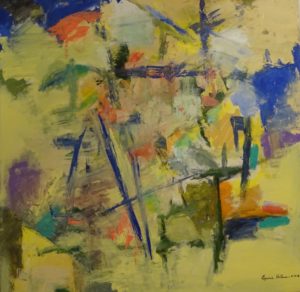
First-person present-tense point of view compels the reader to not only enter Ceci’s mind but also to face for themselves the complex questions you pose about inner and outer beauty. Your questions arise in the dramatic interplay between characters that are not only influenced by the times, but also by their unique natures and experiences. Ceci narrates her story without completely understanding it. This character for the reader may not be who they thought she was on the opening pages.
Character, place and time, society and politics resonate with your questions in real life just as the reader and writer feel during the novel. Truths about attributions made to beauty are unearthed for me as I write. Hopefully Ceci’s conflicts and transformations will step off the page into the minds and hearts of my readers as well.
This woman’s story reflects my recognition that beauty may indeed give a brilliant woman opportunities, however, as Ceci’s world spins out of control such opportunities ultimately confound her self-definition as she comes of age.
It is only when we dive into the humanity under the surface of outward beauty that we uncover who we are.

inner beauty
When beauty in a brilliant woman is ruthlessly prized by men and hated by women it can significantly undermine her path in life resulting in a complex emotional struggle. My protagonist, Ceci, shows us this delicate struggle as it unfolds.
In other words, to more simply answer your question, outer beauty or appearance often influence a woman’s public persona giving her potential advantages for recognition. But the “inherent value” of a woman that lies inside of her gives the weight to real and enduring positive self-esteem.
What’s great about your question from a novelist’s point of view is that the relationship of outward beauty to good and evil and right and wrong blend into shades of gray and violet, dissonance and truth. Ceci’s beauty is embedded in her world and the minds of each unique reader.
To my way of thinking, a beautiful mind is of greater value in the long run than a beautiful appearance could ever be. Beauty is problematic as a woman waits for her internal life to catch up with her external one.
Take a moment to contemplate the French phrase belle laide. Beautiful ugly. What does this phrase make us wonder?
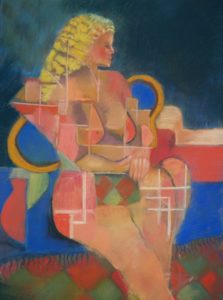
How is this similar or different for men?
Actually, from my perspective, my last statements above apply to men as well as women. An unusually attractive man may interview and obtain a position and even be promoted more easily than another man and revel in an undeserved public persona. But even rare, good looks suggesting prowess will not sustain that position of leadership or authority if his mind falters along the way. Again, belle laide. What does this phrase bring to mind?
Ok super. Here is the main question of our interview. Based on your opinion and experience, what are the “Five Things You Need To Thrive and Succeed as a Powerful Woman?” (Please share a story or example for each.)
Recently I watched the reality series, “Alone” with my grandsons. While my intent was to enjoy time with them as we viewed a challenging wilderness experience by competitors in the Arctic faced with survival for 100 days, I had the opportunity to witness on screen two fascinating, powerful women. Two of the female competitors were filming themselves during their attempt at self-preservation of their bodily and mental integrity enduring sub-zero (-30 F) weather with extremely limited resources except for their own profound ingenuity and physical and mental strength.
Their experiences surely trivialize my descriptions above of envious competitive women in my professional arena. These two young women, Kielyn (age 39, Canada) and Callie (age 31, MT), trained survival experts, literally thrived as powerful women in severely arduous conditions. While a million-dollar prize goes to the winning survivor, that wasn’t their only goal as you will read.
I will quote them to answer this question as I ask you to keep in mind how these solitary women dwelling in their self-built temporary “homes” made of tree limbs, moss, and other indigenous materials have relationships with their animals of prey.
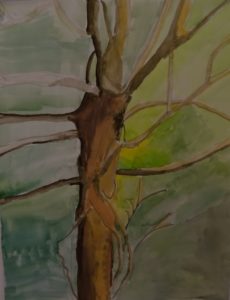
Their extreme experience can be a metaphor for others choosing challenging, but not life-threatening situations.
- Reflect on your attitude when you face challenges. Callie’s attitude demonstrates her inner power and fortitude as well as forethought about others even when her life is at stake. Here is some of her self-talk:
“I need to buck up soldier…wait and think about what to do (when very low on food); “I want to stay out here..see it through..reach my edge.”
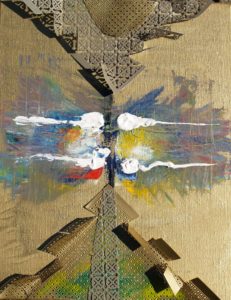
Faced with a porcupine quill embedded in her shoulder: “I have to be careful. Tweezers. Break the skin. I need to cut it out. Oh, I got it out. Nice. Laughs. I feel like my spirit and mind can last 100 days. I think of all the people who have helped me in my life…all the sacrifices my parents have made for me…if I could retire them. I want to try the hardest for them.” “Oh my gosh look at the sunset.”
2. Think through ambivalence about goals. Thoughts of home persist but she will not give up.
“Popcorn with porcupine fat would be really good.”
“Ice chunks on the lake are rising and falling like a chest.” ( -20 F)
“Still feeling really grateful to be here. I think of my mom…an amazing example of a kind unstoppable woman…I feel her strength…like she watches over me…”
“Like this isn’t a game. Decisions I make now will affect the rest of my life. I don’t want any permanent damage…I’m risking losing a frostbitten toe. The flip side I could stay to the end…change my life…help out my family. You want to push. I want to push my edge but not fall over the edge…”
3. Learn how to recognize and deal with fear within yourself tolerating ups and downs without regret.
How Callie deals with fear by looking at her gains and risks:
“Trying to figure out what I want from this experience. To win. But there’s this fear…I’ve dealt with cold before…but it’s my family I want to gift them — ease in their life…Before I left my dad said, ‘remember you’re never alone.’ But I feel alone. Sorry dad. I want to win for women but sometimes my mind is destructive to myself. We are our own worst enemies.”
“Emotionally I’m struggling…when I panic I think home, warmth, food…I’m so happy to see this place from up here…I don’t think it’s worth it to me emotionally to keep going. I’ve pushed my limit as far as I want. I’m proud without regrets. You can’t live life with regrets. I’ve lost the fight. You can’t see a mental weakness and I think that’s a strength to recognize it in yourself that it’s time. I can remember I can really be strong as an individual person. Before I came I thought I was unworthy of the opportunity. But I realize I stepped up to the plate. I’m excited to go home and plan the next adventure. I feel as if I can do anything now.”
(Yet, the next day:)
“I hope you (listeners to her video) are all having a fantastic day.” “I hope I can keep catching rabbits. I still really need you rabbits. I really need you. Oh, my God, a rabbit. Oh, thank you thank you. Another day of good eating. There’s a magical feeling here..having a relationship with my food source, my water. The longer I’m out here the quieter my mind gets. I’m so here. I’m not ready to go back. Another day in Arctic paradise.”
“We got some challenges here. My spirit feels strong. All I need is fish and firewood. C’mon fishes. I’m so hungry. This is just so hard because I’m so close to 100 days and I feel I can. I just keep on trying. Bone broth for dinner. When I feel frustrated and maybe can’t do this I think how hard my parents had to keep going, keep adapting, and that strength lives on inside of me. So, I have to keep going.”
A medic arrives for a site visit to examine her severely frostbitten toe that she made a decision to tell them about. It’s decided for her that she should go home malnourished with potential irreversible damage to her frostbitten feet.
“It’s such a challenging situation. My spirit feels really strong…so much motivation and strength to keep going…I love this place so much…sobs…but I don’t want to lose a toe…do what’s best for my feet…can’t grow another pair of toes…laughs.”
“This experience is so inspiring and empowering. I don’t see the wilderness as a place to struggle against. Humans have lived in this more than we live now. I got the opportunity to practice the skills of my ancestors. To live on the land. My DNA remembers living like this and it just feels right.”
4. Maintain a positive outlook with enthusiasm while being realistic about new risks and adventures.
Kielyn’s thoughts reflect her constant enthusiasm despite formidable odds:
“I would love to be an ambassador for women to be strong survivors.”
“This trout gets me a few more days.”
“Have you ever seen a more beautiful sight?”
“I have good feelings about being home again. Some TLC.”
5. Find your own individual way to tolerate growing disappointment and make decisions even when it means new choices.
Kielyn’s attitude when she faces serious disappointment:
“Am I thriving? Not as well as I’d like to be. I indulged on my last fish. Beware of the calm before the storm…”
When she loses a fish and sobs: “I’m so cold. (Fish,) please come back. I just need to go inside…I’m not able to keep warm like I want so I need more food. I believe I am starving on a slow but consistent rate…it’s time to keep pushing or it’s time to go home…I have motivation and strength but it’s so hard because I have to keep going and also be warm.”
Kielyn decides she’s weighed her options and is ready to go home proud of her accomplishment.
These women felt powerful on the inside for sure although they were obviously physically powerful as well.
A well-known quote from the Odyssey says it best:
“We have still not reached the end of our trials. One more labor lies in store — boundless, laden with danger, great and long, and I must brave it out from start to finish.”
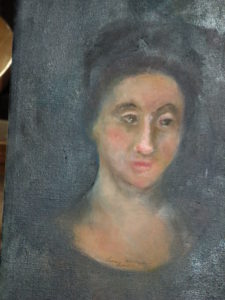
We each need to define what feels finished enough as we move along in order to feel powerful inside.
Thank you for these fantastic insights. We greatly appreciate the time you spent on this.